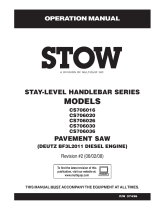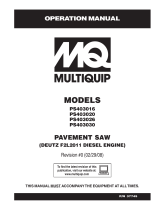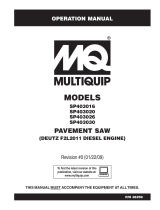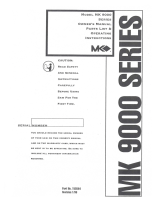
SP-6065
Concrete Saw
Operation Manual
Revision #0 (04/23/03)

2
FOR HELP & INFORMATION CONTACT
MULTIQUIP
Please have the Model and Serial Number on-hand when calling.
MAIN
(M-F 7AM-5PM)
(PACIFIC STANDARD TIME)
MULTIQUIP INC.
18910 WILMINGTION AVE.
CARSON, CALIFORNIA 90746
800-421-1244 or 310-537-3700
PARTS DEPARTMENT
800-427-1244 or 310-537-3700
FAX: 800-672-7877 or 310-637-3284
SERVICE DEPARTMENT/
TECHNICAL ASSISTANCE
800-428-1244 or 310-537-3700
FAX: 310-537-1173
WARRANTY DEPARTMENT
888-661-4279 or 310-661-4279
FAX: 310-537-1173
E-MAIL
WEBSITE
www.multiquip.com

3
Conventions
Throughout this manual, the following conventions are used to indicate
important information.
!
NOTE
Text set off like this presents clarifying information, specific
instructions, commentary, sidelights, or interesting points of
information.
CAUTION
Text set off like this indicates that failure to follow directions could
result in damage to equipment.
WARNING
Text set off like this indicates that failure to follow directions could
result in bodily harm or loss of life.
!
NOTE
It is extremely important that the operator reads and understands the
safety and message section of this manual.

4
WARNING
CALIFORNIA – Proposition 65 Warning
Engine exhaust and some of its constituents, and
some dust created by power sanding, sawing,
grinding, drilling and other construction activities
contain chemicals known to the State of California to
cause cancer, birth defects and other reproductive
harm. Some examples of these chemicals are:
o Lead from lead-based paints.
o Crystalline silica from brick.
o Cement and other masonry products.
o Arsenic and chromium from chemically treated
lumber.
Your risk from these exposures varies, depending on
how often you do this type of work. To reduce your
exposure to these chemicals: ALWAYS work in a
well-ventilated area, and work with approved safety
equipment, such as duct masks that are specially
designed to filter out microscopic particles.

5
TABLE OF CONTENTS
CONVENTIONS...................................................................................................................3
SAFETY..............................................................................................................................7
OPERATION ...................................................................................................................19
BEFORE STARTING..........................................................................................................19
ENGINE POWER, CUTTING POWER & SHEAVE SIZE........................................................20
Blade RPM vs Surface Feet Per Minute (SFPM) ......................................................22
Installing the Blade....................................................................................................24
Stacking Blades for Wide Cuts...................................................................................24
Installing and Removing the Blade Guard.................................................................26
Installing the Collar Guard .......................................................................................27
WATER SUPPLY AND CONTROL ………………………………………………………..28
CONTROL PANEL.............................................................................................................29
HANDLEBARS..................................................................................................................30
FUELING THE SAW .........................................................................................................31
STARTING AND STOPPING THE ENGINE..........................................................................32
COLD WEATHER OPERATION....................................ERROR! BOOKMARK NOT DEFINED.
Glow Plugs...................................................................Error! Bookmark not defined.
Block Heaters.............................................................................................................33
Draining the Water System........................................................................................33
POINTER ADJUSTMENT....................................................................................................33
RAISE — LOWER CONTROLS ..........................................................................................35
SETTING THE DEPTH INDICATOR.....................................................................................35
SETTING THE DEPTH STOP……………………………………………………………..36
DRIVE SYSTEM ...............................................................................................................37
Transaxle ...................................................................................................................38
NIGHT LIGHT ..................................................................................................................39
TRANSPORTATION TIE-DOWNS AND LIFT POINT.............................................................39
Tie-Downs..................................................................................................................40
Lift Point....................................................................................................................41

6
MAINTENANCE.............................................................................................................41
REMOVABLE GUARDS AND ACCESS PANELS...................................................................41
BELTS AND PULLEYS......................................................................................................42
V-Belt Tension............................................................................................................42
Adjusting BladeShaft Drive Belt Tension .................................................................43
Replacing the BladeShaft Belt:..................................................................................44
Replacing the Jackshaft Belt......................................................................................44
Rotary Belt Tensioner ................................................................................................46
BLADESHAFT MAINTENANCE..........................................................................................46
BladeShaft Replacement ............................................................................................46
BLADE COLLAR REMOVAL/INSTALLATION.....................................................................47
CIRCUIT BREAKERS........................................................................................................50
MAXIMUM CUT DEPTH ADJUSTMENT.............................................................................50
LUBRICATION .................................................................................................................51
ENGINE...........................................................................................................................52
Air and Oil Filter Chart.............................................................................................52
PTO DRIVE MAINTENANCE............................................................................................53
REPLACING THE BATTERY..............................................................................................55
RAISE-LOWER SYSTEM...................................................................................................56
JOYSTICK TENSION ADJUSTMENT...................................................................................57
HYDRAULIC SYSTEM MAINTENANCE..............................................................................58
Routine Maintenance................................................................................................58
Draining & Filling the Hydraulic System .................................................................59
Bleeding the Depth Stop Cylinder..............................................................................61
DRIVE WHEEL ALIGNMENT ............................................................................................62
SPECIFICATIONS.........................................................................................................64
DIMENSIONS AND WEIGHTS....................................................................................65
WIRING DIAGRAM ......................................................................................................66

7
SAFETY
FOR YOUR SAFETY AND THE SAFETY OF OTHERS!
Safety precautions should be followed at all times when operating this equipment.
Failure to read and understand the Safety Messages and Operating Instructions could
result in injury to yourself and others.
SAFETY MESSAGE ALERT SYMBOLS
The three (3) Safety Messages shown below will inform you about potential hazards that
could injure you or others. The Safety Messages specifically address the level of
exposure to the operator, and are preceded by one of three words: DANGER,
WARNING, or CAUTION.
Potential hazards associated with SP-6065 Concrete Saw operation will be referenced
with "Hazard Symbols" which appear throughout this manual, and will be referenced in
conjunction with Safety "Message Alert Symbols".
DANGER:
You WILL be KILLED or SERIOUSLY injured if you
DO NOT follow directions.
This Owner's Manual has been developed to provide complete
instructions for the safe and efficient operation of the Multiquip SP-6065
CONCRETE SAW. For engine maintenance information, please refer to
the engine manufacturers instructions for data relative to its safe
operation.
Before using this CONCRETE SAW, ensure that the operating
individual has read and understands all instructions in this
manual.
WARNING:
You CAN be KILLED or SERIOUSLY injured if you
DO NOT follow directions.
CAUTION: You CAN be injured if you DO NOT follow directions.
!
NOTE

8
HAZARD SYMBOLS
Lethal Exhaust Gases
Engine exhaust gases contain poisonous carbon monoxide gas is
colorless and odorless, and can cause death if inhaled. NEVER operate
this equipment in a confined area or structure that does not provide
ample free flow air.
Explosive Fuel
Motor fuels are highly flammable, and can be dangerous if mishandled.
DO NOT start the engine near spilled fuel or combustible fluids. DO
NOT fill the fuel tank while the engine is running or hot. DO NOT overfill
tank, since spilled fuel could ignite if it comes into contact with hot
engine parts or sparks from the ignition system. Store fuel in approved
containers, in well-ventilated areas and away from sparks and flames.
NEVER use fuel as a cleaning agent.
Burn Hazards
Rotating Parts
Engine components can generate extreme heat. To prevent burns,
DO NOT touch these areas while the engine is running or immediately
after operations. NEVER operate the engine with heat shields or heat
guards removed.
NEVER
operate equipment with covers, or guards removed. Keep
fingers, hands, hair and clothing away from all moving parts to
prevent injury.
Accidental Starting
ALWAYS
place the engine
ON/OFF
switch in the
OFF
position,
when the saw is not in use.

9
ALWAYS
wear approved respiratory protection.
Guards and Covers
Rotating Blades
Respiratory Hazard
Sight and Hearing Hazard
NEVER
operate the saw without blade guards and covers in place.
Adhere to safety guidelines ANSI American National Standards
Institute, OSHA or other applicable local regulations.
Rotating blade can cut and crush. Keep hands and feet clear.
ALWAYS wear approved eye and hearing protection.

10
Equipment Damage Messages
Skin Injection Hazard
NEVER
use your hand to find hydraulic leaks. Use a piece of wood
or cardboard. Hydraulic fluid injected into the skin must be treated by
a knowledgeable physician immediately or severe injury or death can
occur.
Other important messages are provided throughout this manual to help
prevent damage to your concrete saw, other property, or the surrounding
environment.
NOTE
This concrete saw, other property, or the surrounding environment could
be damaged if you do not follow instructions.
Over Speed Conditions
NEVER
tamper with the factory settings of the engine governor or
engine settings. Personal injury and damage to the engine or
equipment can result if operating in speed ranges above maximum
allowable.

11
RULES FOR SAFE OPERATION
Most accidents involving product operation, maintenance and repair are caused
by failure to observe basic safety rules and precautions. Accidents can often be
avoided by recognizing potentially hazardous situations before an incident
occurs.
General Safety Warnings
WARNING
§ DO NOT operate or service this equipment before reading this
entire manual. Failure to follow instructions may lead to serious
injury or death.
§ This equipment is to be operated by trained and qualified
personnel only. This equipment should not be operated by
persons under 18 years of age.
§ This equipment is for industrial use and to be used for its
intended purpose only.
§ NEVER operate this equipment when not feeling well due to
fatigue, illness or taking medicine.
§ NEVER operate the saw under the influence of drugs or alcohol.
§ NEVER use accessories or attachments, which are not
recommended by Multiquip for this equipment. Damage to the
equipment and/or injury to user may result. Manufacturer does
not assume responsibility for any accident due to equipment
modifications. Unauthorized equipment modification will void all
warranties.
§ NEVER operate this saw without proper protective clothing;
shatterproof glasses, steel-toed boots, respiration mask, and any
other protective devices required by the job.

12
WARNING
§ Before operating the saw, make sure all protective guards are
securely in place. All saws are supplied with a blade guard, collar
guard and belt guard.
§ Whenever necessary, replace operation and safety decals if they
become difficult to read.
§ Verify the engine start switch is set to the OFF position before
installing a blade.
§ Make sure the operator knows how to turn the engine OFF in case
of an emergency.
§ Do not go near rotating parts (blades, belts, pulleys or wheels)
while engine is running.
§ Catalytic muffler and exhaust gases are extremely hot. Stay clear
of muffler and exhaust gases. Allow these parts to cool before
servicing the saw.
§ Stay clear of the saw while it is being hoisted.
§ Anytime the saw is lifted onto its nose, or tilted fully back, for
maintenance access, the high end MUST be blocked up to prevent
the possibility of crush injury!
§ Allow the engine to cool before adding fuel or performing service
and maintenance functions. Contact with HOT components can
cause serious burns.
§ Never operate the saw in any enclosed or narrow area where free
flow of air is restricted. If the air flow is restricted it will cause
serious damage to the saw’s engine and may cause injury to
people. Remember the saw’s engine gives off DEADLY carbon
monoxide gas.
§ ALWAYS refuel in a well-ventilated area; away from sparks and
open flame. Avoid “topping off” the filler port as spills can result.
§ ALWAYS use extreme caution when working with flammable
liquids. When refueling, STOP the engine and allow it to cool.
§ NEVER smoke around or near the machine. Fire or explosion
could result from fuel vapors, or if fuel is spilled on a HOT engine.
§ NEVER operate the saw in an explosive atmosphere where fumes
are present or near combustible materials. An explosion or fire
could result causing severe bodily harm or even death.
§ NEVER use fuel as a cleaning agent.

13
General Safety Precautions
CAUTION
§ ALWAYS read, understand, and follow procedures in the
Operator’s Manual before attempting to operate the equipment.
§ Be sure the operator is familiar with proper safety precautions
and operating techniques before using the saw.
§ Make sure the operating area is clear before starting the engine.
§ Maintain this equipment in a safe operating condition at all times.
§ Keep the saw clean. It will work better and last longer.
§ Use proper blades and follow the blade manufacturer’s
recommendations. Match blade rpm (Blade Shaft rpm) to
recommended blade surface feet per minute (SFPM).
§ Tighten the 5/8” blade-mounting bolt to 100-125 foot-lbs. torque.
§ Turn engine OFF prior to fueling the saw.
§ Start engine with the joystick in NEUTRAL to prevent unexpected
saw movement.
§ Do not leave saw unattended while engine is running.
§ Do not start engine on a sloping surface to prevent unexpected
loss of control.
§ Do not park or leave saw unattended on a slope - the saw can roll
when the engine is OFF. Block the unit when leaving.
§ If the saw must be parked on a slope, turn it across the angle of
the slope, to prevent accidental downhill movement.
§ Always store equipment properly when not being used. Equipment
should be stored in a clean, dry location out of the reach of
children. When storing the saw in freezing weather, blow out
water lines to prevent damage to components in the water
delivery system.
§ Prior to service, level the frame surface.
§ Do not over tighten the Blade Shaft drive belt.
§ Turn on water flow prior to starting the engine, to prevent
damage to the impeller of a belt-driven water pump.
§ Don’t pollute! Waste oils and other chemicals must be disposed
of in a manner consistent with local and state environmental
protection regulations.

14
BLADE SAFETY
WARNING
§ ALWAYS inspect diamond blades before each use. The blade
should exhibit no cracks, dings, or flaws in the steel centered core
and/or rim. Center (arbor) hole must be undamaged and true.
§ Examine blade flanges for damage, excessive wear and
cleanliness before mounting blade. Blade should fit snugly on the
shaft and against the inside/outside of the saw.
§ Only cut the material that is specified by the blade. Read the
specifications of the blade to ensure the proper tool has been
matched to the material being cut.
§ ALWAYS keep blade guards in place. Exposure of the blade must
not exceed 180 degrees.
§ Ensure that the blade does not come into contact with the ground
or surface during transportation. DO NOT drop the blade on the
ground or surface.
§ The engine governor is designed to permit maximum engine
speed in a no-load condition. Speeds that exceed this limit may
cause the blade to exceed the maximum safe allowable speed.
§ Ensure that the blade is mounted for proper operating direction.

15
SAW TRANSPORTATION SAFETY
CAUTION
§ Use appropriate lifting equipment to ensure the safe movement of
the saw.
§ DO NOT use the handle bars and/or front pointer as lifting points.
§ NEVER attempt to tow the untrailered saw behind a vehicle.
§ NEVER transport the saw with the blade mounted.
EMERGENCIES
§ ALWAYS know the location of the
nearest fire extinguisher.
§ ALWAYS know the location of the
nearest first aid kit.
§ In emergencies always know the
location of the nearest phone or
keep a phone on the job site.
Also know the phone numbers of the
nearest ambulance, doctor, and fire
department. This information will be
invaluable in the case of an emergency.

16
MACHINE OPERATION AND SAFETY DECALS
The Multiquip SP-6065 Saw is equipped with a number of operation and safety
decals. Should any of these decals become unreadable, replacements can be
obtained from your dealer.
KEEP HANDS
CLEAR
WARNING!
KEEP FEET
CLEAR
WARNING
When Larger Blade and Guard
is Installed, Belt Drive MUST
Be Changed to Proper Size.
See Owners Manual.
S.M.I. MASONRY AND CONCRETE
SAW MANUFACTURER’S INSTITUTE
CAUTION
FAILURE TO COMPLY WITH THE C C AH
JADV EEE AV EEA OIEJGGVCBVVZ
P/N 25249-001
P/N 22122-001
P/N 23330-001
P/N 25250-001
P/N 36099 (ISO Blue)
P/N 11247 (ISO Black)
DECAL SHEET INTL STDS
P/N 11246
LUBRICATIONCHECK HOT
BELT DRIVE
P/N 15581
P/N 15582
P/N 15580
P/N 13118
P/N 25491 P/N 25678
CONTACT MULTIQUIP
SERVICE DEPARTMENT
MODEL
SERIAL NO.

17
Serial Tag
Fig. 1 — Serial Tag
!
NOTE
For future reference, fill in the model number and serial number of
your saw in the spaces on the label above.
The serial tag contains the model number and serial number of the saw. This
information details all parts that were included with the saw when it was
shipped from the factory, as well as the date of manufacture.
Record your ENGINE model, specification number and serial number here:
MODEL NO. SPEC. NO. SERIAL NO.
The SERIAL TAG is bonded to the panel forward of the console, (between the
console and the engine).

18
SERIAL TAG
ENGINE SERIAL
NUMBERS
Fig. 2 — Serial Number Locations
!
NOTE
§ The 5/8” blade-mounting bolt on the right side of the saw (as
viewed from the operator’s position) has a left hand thread, while
the blade-mounting bolt on the left side of the saw has a right
hand thread.
§ Most saw hardware is measured in English (inch) units. The
Illustrated Parts List notes any Metric hardware. Be sure to use the
correct hardware and proper tools.

19
OPERATION
Before Starting
Before starting the saw, carefully follow the checklist below:
r Securely install the Belt Guard (2).
r Fully slide on the Collar Guard (3).
r Verify that proper-sized Blade Guard (4) is fully installed on the Blade
Guard mounting tab.
r Confirm the rear and side access panels (5) & (6) and engine protector
are in place.
r Wear eye and hearing protection and protective clothing.
r Adjust handle bars (1) for best operator control.
r If a belt driven water pump is installed, do not run the engine with the
water pump switch on, unless the water supply is connected and
water is flowing.
Fig. 3 — Guards & Panels
1
4
3
2
5
6

20
Engine Power, Cutting Power & Sheave Size
The cutting capability of your saw is a relationship between engine power (as
reflected in the engine RPM) and the speed (RPM) of the Blade Shaft. The
gasoline engine of the SP-6065 runs at 2800 RPM (full load). If 2800 RPM was a
desirable Blade Shaft speed for the average conditions in which you work, we
would use the same size sheave on the engine shaft and the Blade Shaft; and the
ratio between the two would be 1 : 1.
Fig. 4 — Blade Shaft Ratios
If, however, for your cutting conditions, you need a Blade Shaft speed slower
than the engine speed (and this is usually the case), then we need to INCREASE
the ratio between the two speeds by putting a larger diameter sheave on the
Blade Shaft.
If, for example, you know from experience that you need a Blade Shaft speed of
2000 RPM for the size of blade you normally use (see the Blade RPM vs. SFPM
Chart, below):
2800 (engine RPM) ÷ 2000 (desired BS RPM) = 1.4
This is the ratio 1.4 : 1, which means that for every 1.4 revolutions of the engine,
the Blade Shaft only turns once.
Ratios greater than 1 : 1 also have the beneficial effect of increasing the torque of
the Blade Shaft by the same factor (1.4 in our example) . The manufacturer
advertises that the Deutz BF31011 diesel engine develops 123 ft. lbs. of torque.
To find the theoretical torque of our example saw setup:
123 x 1.4 = 172.2 ft. lbs.
Actual torque of the saw will vary somewhat. In general, more torque means
more cutting power.
1 : 1 1.4 : 1
Blade Shaft
Blade Shaft
Engine
Engine
Page is loading ...
Page is loading ...
Page is loading ...
Page is loading ...
Page is loading ...
Page is loading ...
Page is loading ...
Page is loading ...
Page is loading ...
Page is loading ...
Page is loading ...
Page is loading ...
Page is loading ...
Page is loading ...
Page is loading ...
Page is loading ...
Page is loading ...
Page is loading ...
Page is loading ...
Page is loading ...
Page is loading ...
Page is loading ...
Page is loading ...
Page is loading ...
Page is loading ...
Page is loading ...
Page is loading ...
Page is loading ...
Page is loading ...
Page is loading ...
Page is loading ...
Page is loading ...
Page is loading ...
Page is loading ...
Page is loading ...
Page is loading ...
Page is loading ...
Page is loading ...
Page is loading ...
Page is loading ...
Page is loading ...
Page is loading ...
Page is loading ...
Page is loading ...
Page is loading ...
Page is loading ...
/









